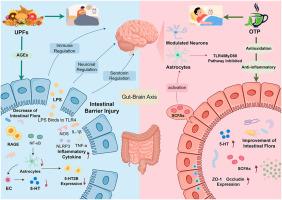肠道微生物-星形胶质细胞串扰:乌龙茶多酚逆转超加工食品引起的睡眠恶化的新途径
IF 5.9
1区 农林科学
Q1 FOOD SCIENCE & TECHNOLOGY
引用次数: 0
摘要
在经济和社会加速发展的背景下,超加工食品(upf)的消费显著增加,晚期糖基化终产物(age)的存在进一步加剧了与upf相关的健康风险。AGEs通过微生物-肠-脑轴(MGBA)显著损害睡眠质量,特别是通过破坏肠道微生物群稳态,影响5-羟色胺(5-HT)的合成和代谢,随后干扰星形胶质细胞功能,导致睡眠障碍。本文系统阐述了AGEs在upf中的形成机制,对肠道微生物群的负面影响,以及它们通过MGBA影响睡眠的多种途径。乌龙茶多酚(OTP)是茶叶中主要的多酚类化合物,具有显著的抗氧化和抗炎作用。它们可以通过调节肠道菌群结构、增强短链脂肪酸(SCFAs)的产生、恢复肠道屏障功能以及进一步介导星形胶质细胞活化和5-羟色胺代谢来改善ages诱导的睡眠质量下降。本文重点探讨了睡眠干预通过MGBA缓解睡眠障碍的机制,为制定睡眠障碍的预防和治疗策略提供了新的视角。本文章由计算机程序翻译,如有差异,请以英文原文为准。

Gut microbiota-astrocyte crosstalk: A novel pathway for oolong tea polyphenols to reverse ultra-processed foods-induced sleep deterioration
In the context of accelerated economic and societal development, the consumption of ultra-processed foods (UPFs) has increased significantly, and the presence of advanced glycation end products (AGEs) further exacerbates the health risks associated with UPFs. AGEs significantly impair sleep quality through the microbiota-gut-brain axis (MGBA), particularly by disrupting gut microbiota homeostasis, affecting the synthesis and metabolism of 5-hydroxytryptamine (5-HT), and subsequently interfering with astrocyte function, leading to sleep disorders. This article systematically elaborates on the formation mechanism of AGEs in UPFs, their negative impact on gut microbiota, and the multiple pathways through which they affect sleep via the MGBA. Oolong tea polyphenols (OTP), as the main polyphenolic compounds in tea, possess significant antioxidant and anti-inflammatory properties. They can improve AGEs-induced decline in sleep quality by modulating gut microbiota structure, enhancing short-chain fatty acids (SCFAs) production, restoring intestinal barrier function, and further mediating astrocyte activation and 5-HT metabolism. This article focuses on the mechanism by which OTP alleviate sleep disorders through the MGBA, providing new perspectives for developing prevention and treatment strategies for sleep disorders.
求助全文
通过发布文献求助,成功后即可免费获取论文全文。
去求助
来源期刊

Food Bioscience
Biochemistry, Genetics and Molecular Biology-Biochemistry
CiteScore
6.40
自引率
5.80%
发文量
671
审稿时长
27 days
期刊介绍:
Food Bioscience is a peer-reviewed journal that aims to provide a forum for recent developments in the field of bio-related food research. The journal focuses on both fundamental and applied research worldwide, with special attention to ethnic and cultural aspects of food bioresearch.
 求助内容:
求助内容: 应助结果提醒方式:
应助结果提醒方式:


